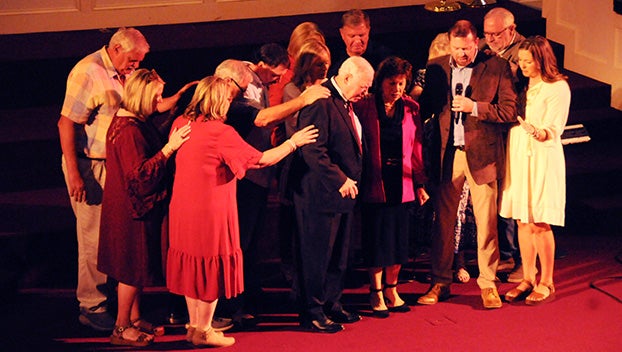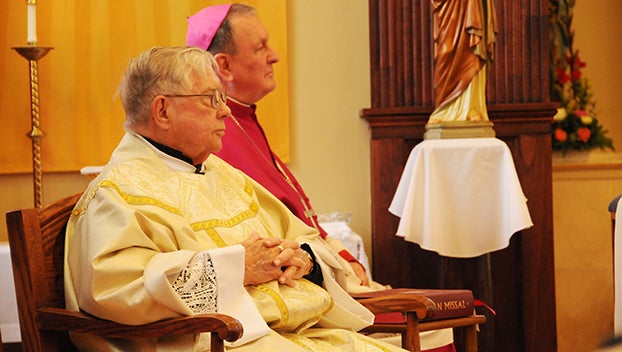Expressing ourselves to God
Published 12:08 pm Monday, February 7, 2011
Modern child-rearing instructions seem to say that parents should make an effort to make sure that their children have the latitude to “express themselves.” A habit of talking back, or misbehaving at school—that’s just a sensitive child expressing himself or herself. Of course, children should be able to express themselves—but only within the boundaries and rules established by authority figures. In our culture, there’s kind of a general, unwritten rule, that all of us should have the freedom to express ourselves.
Years ago, singer Madonna wrote and performed a song, “Express Yourself.” Commenting on the lyrics, she said, “If you don’t express yourself, if you don’t say what you want, then you’re not going to get it. And in effect you are chained down by your inability to say what you feel or go after what you want.” On this occasion, she spoke truth. The Bible says, “Yet you don’t have what you want because… you don’t ask God for it.” (James 4:2, NLT)
Here’s the all-knowing God Who knows everything about us—our needs—our wants— even before we ask. And He has plans—He knows He’s going to do. Surely seems any effort to express ourselves to Him would be a moot point. Yet the Bible clearly says that God desires that we express ourselves to Him— in worship, in praise, through our behavior, through serving Him, and in prayer.
Should we have the freedom to talk to God— to express ourselves to Him just any ol’ way we want to? We can’t forget this. He’s God, and we are not. He’s not our “good-buddy.” He’s not “the man upstairs.” He’s the transcendent, holy, all-powerful all-righteous Creator.
That means that we should express ourselves, but we need to be very careful how we express ourselves. There are boundaries, and there are rules for expressing ourselves to God, and it’s in our best interest to stay within those boundaries.
Israel had crossed the line with her unfaithfulness and disobedience and God had allowed a pagan nation to conquer them. The conquering nation exiled the Jews to all parts of the earth only after they came into Jerusalem and destroyed everything. Psalm 74 was probably written right after the invasion, and right before the exile. Israel was at her lowest— absolutely uncertain about her future. One of the Temple worship leaders, Asaph, expresses himself to God. In adverse times we are more likely to lash out at God, and to step outside the boundaries of expressing ourselves to Him. So, from this Psalm, let’s just notice what might be some rules for expressing ourselves to God.
Be honest. We should tell God exactly how we feel about things. Sounds like kind of a weird thing to say. How can we be anything but honest before a God who knows everything? But the truth is, we do try to hide things from God. Asaph, to quote an old song from the sixties, lets “it all hang out.” It doesn’t appear he is holding back. He wants to know why God has “rejected” His people. (Vs. 1) He wants to know why God is “angry.” (Vs. 1) He wants to know where God has been. “We no longer see your miraculous signs.” (Vs. 9) “All the prophets are gone.” (Vs. 9) He wants to know why God hasn’t taken action against these people who have destroyed His people. “Why do you hold back your strong right hand?” (Vs. 11)
Israel’s adversity doesn’t make sense to him. He doesn’t understand why a loving God, and a God with power enough to prevent it all, is allowing it to happen. So he asks God, “Why?” He’s honest. Asking why is the beginning of our process of understanding.
Be knowledgeable. When we express ourselves to God, it’s a good idea to have done our homework. We waste brainpower, efforts, and go to a lot of extra trouble when we express ourselves to God without the attainable facts. In the first seasons of Saturday Night Live, Gilda Radner played a character known as Emily Latilla. Emily would come on the news and rant about some particular news item, and viewers would notice right off that she didn’t have all the facts about what she was talking about. The anchorman would whisper the facts to her. She would stop and say, “Well then. Never mind.”
Asaph speaks of a specific knowledge— knowledgeable regarding his relationship with God. Before we express ourselves to God, it would be a good idea to examine and solidify our relationship with Him.
Notice the references to relationship. “Why is your anger so intense against… the sheep of your own pasture?” (Vs. 1) “We are the people you chose long ago, the tribe you redeemed as your own special possession.” (Vs. 2) And notice another way Asaph expressed this relationship. The Jews and God— they were on the same side. Israel’s enemies are therefore God’s enemies. “See how your enemy has destroyed your sanctuary. There your enemies shouted their victorious battle cries…” “They burned your sanctuary to the ground. They defiled the place that bears your name.” (Vs. 3-4, 7) And to nail down the issue of relationship, Asaph pulled his trump card. “Remember your covenant promises…” (Vs. 20) If nothing else got God’s attention this did. He was/is the covenant making, covenant-keeping God— and the covenant is the evidence of relationship. Whenever adversity comes, that’s the time to nail down our relationship with Him.
Be specific. This is something the Bible teaches about prayer. Pray in specifics, not in generalities. Not, “God, forgive all my sins,” but “God, forgive this sin and that sin.” Not, “God, bless all the missionaries,” but “God, bless this missionary and that missionary in this place.”
And although God knows all about our troubles— every detail, it’s good for us to express ourselves in specifics. The Psalmist seemed to have no trouble doing this, as He describes his nation’s adversity— and invites God to take a look for Himself. He speaks of the “awful ruins of the city.” (Vs. 3) The “sanctuary” “destroyed.” (Vs. 3) He speaks of the “carved paneling” in the temple being destroyed by “axes.” (Vs. 5-6) He speaks of the “sanctuary” being “burned” “to the ground.” (Vs. 7) The whole place being “defiled.” (Vs. 7) He described to God exactly what He saw— in detail. There was probably more destruction but this is what most offended him. It’s as if he wanted God to feel exactly what he was feeling. And the only way to express that emotion was to be specific about what was bothering Him.
Be reverent. We can’t forget as we are expressing ourselves, that He is God. It’s important in our worship. We must be expressive, but at the same time, we must be reverent. Being reverent means understanding that some things are sacred and must be treated differently. We see the Psalmist’s reverence for God come through, as he is personally offended when the sacred things of God are violated. “With axes and picks, they smashed the carved paneling.” (Vs. 6) “They burned your sanctuary to the ground. They defiled the place that bears your name. (Vs. 7) “They burned down all the places where God is worshiped.” (Vs. 8) And how did the Psalmist view all of this? He viewed it as pagan people “insulting” (Vs. 10, 18, 22) God, and “dishonoring” (Vs. 10, 18) His name. Here were people who did not reverence God. When we are expressing ourselves to God, let’s make sure that we respect and not speak against the sacred things of God— His Word, His promises, His character, His reputation, His people, His church. What is sacred to Him must be sacred to us.
Be certain. We must be certain of God’s character and… His ability. We must be people of faith believing that nothing is impossible with God. The Psalmist does this through a history lesson. “You, O God, are my king from ages past, bringing salvation to the earth.” (Vs. 12) “You split the sea by your strength…” (Vs. 13) — “You… smashed the heads of the sea monsters.” (13) “You crushed the heads of the Leviathan and let the desert animals eat him.” (Vs. 14) “You caused the springs and streams to gush forth…” (Vs. 15) The Psalmist looked over what God had done— what He had done specifically for the Jews, and He was certain, that He could handle their problem.
Be bold. Since we are in relationship with Him, and because we know our status before Him, and since He already knows what we are thinking, and since we are certain of His power and ability, we can boldly express to Him our heart’s desire. The writer of Hebrews said, “And so, dear brothers and sisters, we can boldly enter heaven’s Most Holy Place because of the blood of Jesus.” (Hebrews 10:19, NLT)
The Psalmist is pretty bold in his requests. It’s pretty bold to tell God that He’s moving kind of slow. (Vs. 10-11) It’s kind of bold to tell God specifically how He needs to fix the problem. (Vs. 21) And any time we say to God, “Don’t…”— we are getting kind of bossy.
Express ourselves to God? Sure. But… let’s be honest, knowledgeable, specific, reverent, certain, and bold.
Arnold E. Hendrix, Jr.
First Baptist Church
Atmore, AL




